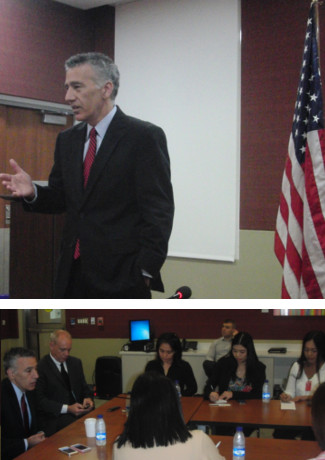By Naomi Fontanos
*In memory of Jennifer Laude who will be memorialized in the 2014 Transgender Day of Remembrance (TDOR). November 20 is the 40th day after Jennifer Laude’s death.
The moment she was killed, what were the final thoughts of Jennifer Laude, the 26 year old transgender Filipina whose lifeless body was found with her head inside a motel toilet bowl in Olongapo City, Philippines? According to a police report, Laude died from asphyxiation. The primary suspect in her killing, Pfc. Joseph Scott Pemberton, is a crew member of the USS Peleliu that was in the Philippines for joint military exercises under the Visiting Forces Agreement (VFA). Pemberton was the last person seen with Laude when both of them checked in the Celzone Lodge on October 11, 2014.
Did Jennifer Laude think of her mother, Julita Cabillan, whose hair Jennifer Laude brushed the last time they saw each other? Or did she think of her sister, Michelle Laude, whom she was just with less than an hour ago? Did memories of her other sister Marilou Laude and her fiancé Marc Sueselbeck flash in her mind while she was being dragged into the motel bathroom? Feeling the brute force on her neck, her face in the toilet bowl, what thoughts ran through Jennifer Laude’s head? Did her survival instincts kick in? Did she fight her murderer? Did she ask him to stop?
 I was wrapped up in these thoughts on Friday morning, October 24, on my way to the US embassy in Manila. My reverie was broken by a phone call from an unlisted number. The woman’s voice on the other end sounded American, and it took me a moment to understand that it was Anna Richey, the US embassy spokesperson. I had an appointment to meet the US Ambassador to the Philippines Philip Goldberg at 11 AM that morning for a roundtable discussion with selected media outlets. I was sitting in the discussion on behalf of Outrage Magazine, the online zine for lesbian, gay, bisexual, and transgender (LGBT) Filipinos.
I was wrapped up in these thoughts on Friday morning, October 24, on my way to the US embassy in Manila. My reverie was broken by a phone call from an unlisted number. The woman’s voice on the other end sounded American, and it took me a moment to understand that it was Anna Richey, the US embassy spokesperson. I had an appointment to meet the US Ambassador to the Philippines Philip Goldberg at 11 AM that morning for a roundtable discussion with selected media outlets. I was sitting in the discussion on behalf of Outrage Magazine, the online zine for lesbian, gay, bisexual, and transgender (LGBT) Filipinos.
I was taken aback by the call. Richey asked me if I wanted to have a one-to-one meeting with Ambassador Goldberg. She said I could either meet the ambassador at 10:30 AM or at 11:30 AM, before or after the scheduled roundtable. I did not ask why the offer was suddenly being made to me, but it sounded like the embassy was worried I would say or ask something that would embarrass Goldberg. I refused the offer.
It was not going to be the first time for me to meet Goldberg. I met him first in June 2014 at his Forbes Park home in Makati where the embassy holds an annual reception in honor of LGBT Pride month. The reception is meant to celebrate LGBT Pride and is attended mostly by LGBT activists in Manila and their allies. During the reception, Goldberg tried to be warm but seemed guarded. He looked like he could not wait for the reception to be done. Many people in the reception remarked how Spartan the set up was compared to receptions past. Knowing that Goldberg’s background was in intelligence, I saw why LGBT issues would not be his personal priority.
Goldberg’s aloof exterior came back to my mind when I received the email invitation to see him at the embassy compound to supposedly talk about the Visiting Forces Agreement (VFA), the Enhanced Defense Cooperation Act (EDCA) and the Olongapo incident. Incident, I thought, sounded like diplomatic doubletalk. It sounded like a “crisis management” attempt to downplay what happened to Jennifer Laude. Sitting across Goldberg that morning, I could not help but think how different the circumstances of our first encounter were compared to the reason we were meeting that Friday.
There were five other women journalists at the table that morning. We were instructed to ask two questions each. Within a week after the Jennifer Laude case exploded, talk was rife that according to former LGBT Pentagon members, there was a plan to fly Pemberton to the US, try him in a military court and invite the Laude family to the court martial. When I asked the ambassador this, he said he did not know where I got the information from and denied the claim outright.
The other journalists present asked the ambassador questions that he already answered in media interviews he had recently given. He told us nothing new and the ambassador sounded like he was mouthing off a memorized script repeating lines about following the VFA, respecting the rule of law, upholding the rights of American citizens in criminal cases abroad and extolling the virtues of EDCA. All I could think of was the night Jennifer Laude was killed. Goldberg mentioned that the embassy was committed to LGBT human rights and interested in getting Jennifer Laude and her family justice.
Looking in his eyes, I asked Ambassador Goldberg what to him constituted justice for Jennifer Laude. Like the well-trained diplomat that he was, Goldberg said justice for Jennifer Laude meant finding the truth and punishing those responsible. Before Goldberg said this, however, he said he was talking in hypothetical terms reminding those present that nobody had yet been charged for killing Jennifer Laude. At that moment, I thought of Jennifer Laude’s mother, sisters and fiancé. I thought of their pain and their sorrow. Incident. Hypothetical. Truth. These are the code words that bend the arc of Jennifer Laude’s story towards injustice. At that moment, I felt the powerful crush of inequity weighing down on Jennifer Laude’s death.

































































